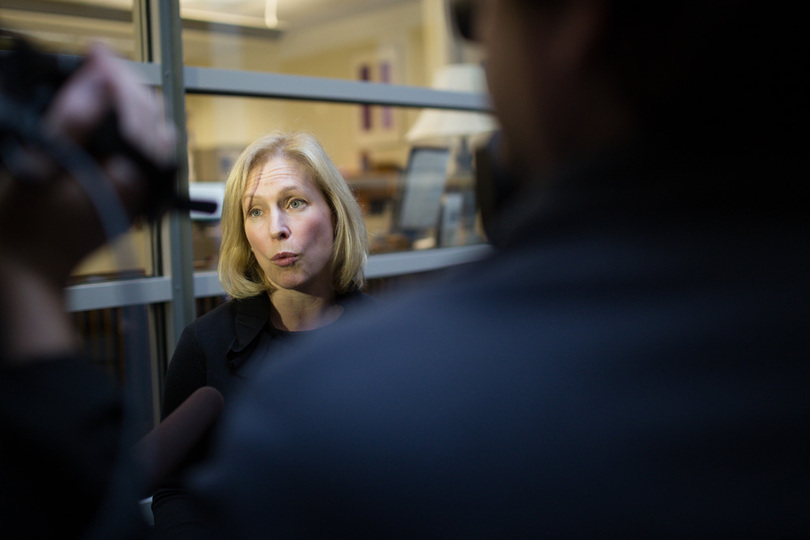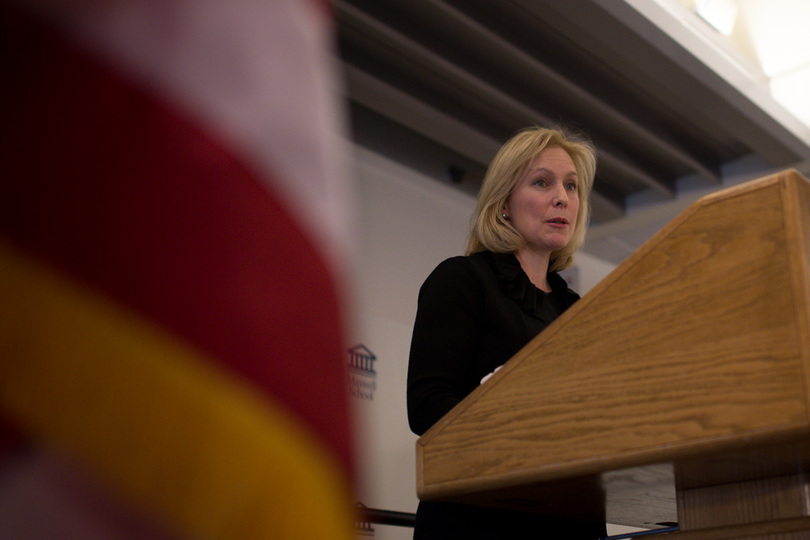Gillibrand discusses plans for improving workplace, strengthening middle class
For U.S. Senator Kirsten Gillibrand, the status of women in the workplace must be improved if the U.S. hopes to strengthen economic stability in the middle class.
“Why would you short change half of the economy’s workforce?” she said.
The senator spoke in Maxwell on Friday at the Maxwell School of Citizenship and Public Affairs’ State of Democracy Lecture series. During her lecture, titled “The American Opportunity Agenda,” Gillibrand (D-N.Y.) outlined her five solutions for ensuring economic stability in the middle class.
“The rules of earning the American Dream have changed,” Gillibrand said.
The goal of the American Opportunity Agenda is to enforce policies that will empower women and their families, Gillibrand said.
40 percent of women in the U.S. are now the primary breadwinners in their family, she said, “but you wouldn’t know that was the case if you looked at our workplace policies.”
Gillibrand’s first solution is to provide paid family medical leave. This opportunity would come from a small portion of an employee’s paycheck, at the same cost of paying for one cup of coffee a week, she said.
She said the United States is the only advanced nation in the world that doesn’t offer paid leave.
Her second solution is to raise the minimum wage to $10.10 an hour. As a result, Gillibrand added, the gross domestic product would increase by $33 billion within the next three years.
“When you increase the minimum wage, every dime is spent on the economy,” Gillibrand said.
In order to be above the poverty line, she said Americans need to have living wage. She said the current minimum wage of $7.25 an hour has failed to surpass the poverty line.
More than 64 percent of minimum wage earners are women, according to Senator Gillibrand’s website.
The third and fourth bullet points in the senator’s agenda are to provide universal pre-k schooling and to create affordable childcare.
Gillibrand said many women struggle to choose between their loved ones, family, and their career. When that is the case, she said, women are thrown off track within their careers.
When working mothers are forced to abandon their careers because they cannot afford to pay for childcare, businesses suffer too because it costs more money to replace and retrain new employees, Gillibrand said.
Gillibrand said the fifth and final aspect of The American Opportunity Agenda is to achieve equal pay for women. She said women only earn 77 cents to every dollar that is earned by men, and the difference becomes greater for women of color.
According to the senator’s website, equal pay would become more attainable through the passing of the Paycheck Fairness Act, which would provide women more legal opportunities to properly seek justice for wage inequality cases.
Gillibrand closed the lecture by expressing her dedication to pass the bills that will support the five solutions in The American Opportunity Agenda.
“I am ready to work hard over the next six months to get co-sponsors,” Gillibrand said.
Margaret Thompson, an associate professor of history and political science at the Maxwell School, said Gillibrand made a persuasive case on her position.
“I think it’s important that she articulate the gendered aspects of the policy issues that disproportionately affect women and thus disaffect families,” Thompson said.
Alexandra Doney, a sophomore studying political science and citizenship and civic engagement, said Gillibrand seems like a passionate senator and said she agreed with everything the senator proposed.
Said Doney: “I’m proud of what she’s doing for women and minorities, and I wish more men in politics would take her stand.”
Published on January 17, 2014 at 11:54 pm
Contact Anna: almerod@syr.edu







